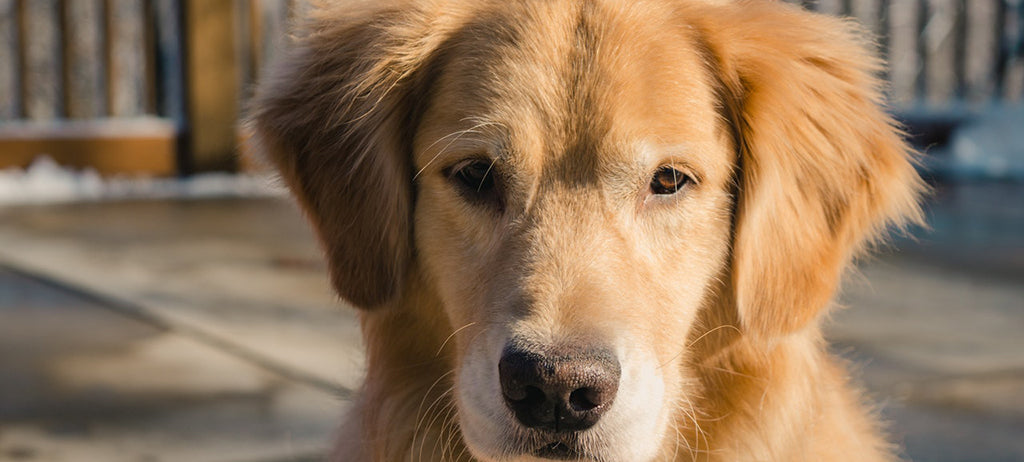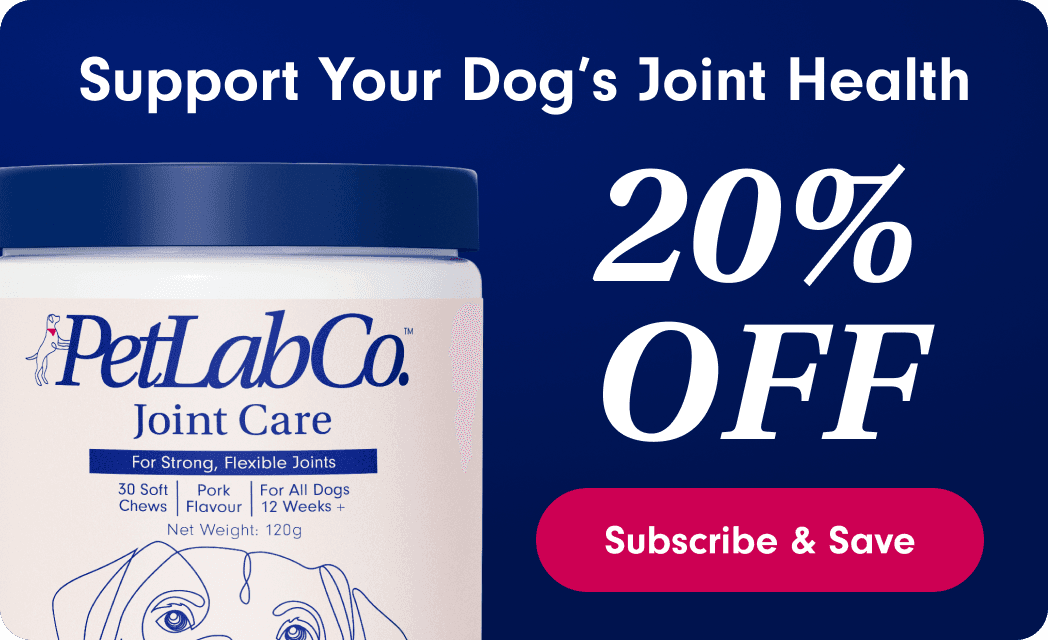
10 Symptoms Of Cancer In Dogs To Look Out For
Estimated Read Time: 6 minutes
Summary: In this blog, learn about the symptoms of cancer in dogs. Discover the symptoms of cancer in dogs to look out for and how to help prevent your dog from developing conditions like cancer.
Cancer is a risk for dogs, as much as it is for humans. And as our canine companions get older, their bodies are far more susceptible to health risks and diseases. According to the American Veterinary Medical Association, around half of dogs over the age of 10 in the United States will develop cancer. That's a huge amount.
Cancer is an uncontrolled cell growth in or on the body, which can either be localised, or it spreads by attaching to neighbouring tissues. When found early, it can be removed with a surgical procedure, but the later it’s found, the more dangerous it can become for your dog. Cancer can spread around a dog’s body faster than it can a human’s body, resulting in approximately 50% of deaths in dogs is caused by cancer.
However, there are ways to spot cancer from early on, and there are steps you can take to reduce the chance of your beloved dog from developing this deadly disease. As soon as you notice any of the symptoms, take your dog to a veterinarian for a diagnosis to give them the best chance of survival.

Symptoms Of Cancer In Dogs
Abnormal Swelling Or Bumps Under The Skin
It’s important to check your dog’s skin regularly for bumps and lumps, which you can do just by stroking them. Don’t forget to check around the face and behind the ears. Even if you only spot a small lump, if it is cancerous, the lump may grow or spread. If the swelling or bump bleeds or leeks, seek medical attention immediately.
Sores That Don't Heal
If your dog has sores or wounds that aren’t healing properly, this could be a sign of a bigger medical problem such as cancer. If you notice that a wound is taking longer than normal to heal, ask your vet to check why this could be happening.
Loss Of Appetite
A change in appetite could be down to a variety of different health problems, from the serious to the silly. But this behavioural change is your dog’s way of showing that something isn’t quite right. Listen to them, and get them checked by a vet because it could save their life.
Weight Loss
Dogs tend to maintain their weight naturally if their exercise and feeding habits don’t change. So, if you notice that your dog is losing weight, without a change in diet, then that instantaneous loss is likely caused by a deeper health problem and could be a symptom of cancer in dogs.
Offensive Odor
Although “dog breath” is common and often very unpleasant, you may recognise a smell worse than normal. If you do, it could be a sign of oral or throat cancer. Or, you may notice a bad smell coming from their nose or rectal area, which is a sign that there could be a tumour there.
Vomiting & Diarrhoea
Regular vomiting is a sure sign that your dog is suffering from a health problem, and cancer could be it. Diarrhoea is also a sign that their stomach is suffering. Also, check for visible bloating and distension of their abdomen. If you notice that their stomach is playing up, along with any other of these symptoms, take them to the vet.
Difficulty Defecating
If your dog’s poo is thin and ribbon-like, their guts might have an issue. And if your dog is male and struggling to pass stools, there’s a possibility it’s caused by prostate cancer. Take note of how their stools look over a couple of days, and if you suspect it’s not just that they ate something dodgy, seek out medical help.
Lethargy
You know your dog, and if they seem more tired than normal, it could be caused by sickness. Lethargy mixed with another symptom could be signalling a bigger problem.
Behavioural Changes
As well as a change in appetite, a rise in aggression or nervousness may indicate that your pooch isn’t feeling well. They can’t actually tell you in words that they’re feeling unwell, so if you’re wondering why they’re acting differently, there’s a possibility something is wrong. Behavioural changes could be one of many symptoms of cancer in dogs.
Wheezing & Coughing
If your pup is finding it difficult to breathe, it’s an instant warning that something is wrong with their lungs. Listen out for wheezing, and if they’re out of breath after walks or games that they used to play for hours, their health may be endangered.

Can I Stop My Dog Developing Cancer?
We can’t tell you that anything will prevent cancer, because there is not a straight forward cause of the disease. It can affect different parts of the body at any age, although with older age, the chances do increase.
But, we have come up with some simple tips that could reduce the chances of your furry friend developing cancer. They will help your dog stay healthy, and hopefully keep them away from nasty illnesses, but there is no guarantee that they can prevent cancer or any other disease from occurring.
Keep Checking
The only way to know for sure whether your dog is well is to keep checking. Feel their skin, watch their behaviour, smell for odours, and take them to their annual health checks at the veterinarian! If you are concerned that your pup is at risk of cancer, ask for more regular health checks. Early diagnosis is the key to stopping cancer from taking your dog’s life.
Healthy Diet And Good Weight
Dogs that are overweight are far more likely to develop health problems that affect their heart, kidneys, lungs, and their joints, which can cause them tremendous pain. But, it can also increase the chance of cancer.
It’s also essential to give your dog all the vitamins they need. Feed them a healthy diet – yes, that can include fruit and vegetables! Although, be careful, because certain foods can be fatal for dogs.
If you worry that your pal isn’t getting all the nutrients he needs, and you don’t know how to feed them to him (or perhaps they’re a fussy eater), you can give it to them in supplement form! Look to a reputable pet brand who make multivitamin supplements for dogs, to help boost their overall health and vitality.
Good Oral Hygiene
Dental hygiene in dogs is often overlooked, but it's actually incredibly important for their overall health! Dogs do a lot with their mouths, which means foreign objects and bacteria can get into their systems, causing further health problems.
The more direct risk is oral cancer. Cleanliness can’t necessarily keep your dog’s mouth 100% safe from mouth cancer, but the more often you brush it, the more aware you are of changes such as tumours appearing. Keep an eye on their gums, lips, and pallet.
Spaying Or Neutering
Spaying a female pet will eliminate the possibility of uterine or ovarian cancer, and decrease the likelihood of breast cancer. Neutering male pets will reduce the chance of getting prostate cancer. It’s also said that spaying and neutering give your dog a higher chance for a longer and healthier life!

Symptoms Of Cancer In Dogs
Cancer is sadly unpreventable, but looking for the signs early on is the best way to give your pup a chance at surviving the disease. Especially as your dog gets older, look out for the symptoms listed here, and never be afraid to ask your veterinarian for a health check if you’re unsure! If you find that your dog has been diagnosed with cancer, it’s up to you and your vet to decide what’s best for your dog. Treatment can be traumatic for both you and your dog, so make sure you make the right decision.
Sources
"Cancer In Pets" American Veterinary Medical Association https://www.avma.org/resources/pet-owners/petcare/cancer-pets
Author Abraham, Marc "Cancer" The Kennel Club https://www.thekennelclub.org.uk/health/for-owners/canine-cancer/
"Spay & Neuter Your Pets" Brown University https://www.brown.edu/Research/Colwill_Lab/CBP/spaynueter.htm







